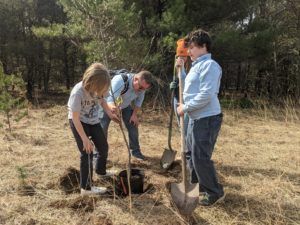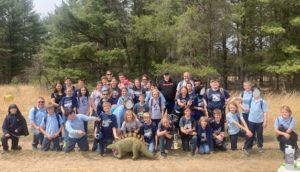On the Ground Junior: Students from Grand Traverse Academy Enhance Pollinator Habitat on Public Land

GTA students are assisted by their teacher, Mr. Lazar, in planting serviceberry bushes within their new pollinator garden in the Traverse City Forest Management Unit.
On Thursday, May 5, 2022, 37 5th and 6th grade students and 10 chaperones from Grand Traverse Academy (GTA) in Traverse City volunteered with OTG Jr and the MDNR to plant a pollinator garden and help build a deer exclosure in the Traverse City Forest Management Unit (FMU) in Union Twp. Students broadcast-planted wildflower seeds, as well as planted 24 potted plants including lupine. They also planted 24 large shrubs including serviceberry and nannyberry. These soft mast-producing shrubs are an important component of healthy wildlife habitat. Not only are the shrubs well-adapted to local growing conditions, but they also attract target pollinator species like songbirds, insects, and small mammals that may consume the fruit mast and disperse seeds into the environment.
After planting the flowers and shrubs, students helped place large posts that will anchor the fencing used to exclude deer from the garden. When plants and shrubs are initially placed into a new area, it’s a good idea to protect them using tubing or fences to keep deer and other wildlife from browsing on all of the new buds. Once the plants are well-established, the fencing may be removed and reused.

Students from GTA gather for a group photo after getting their hands dirty in their newly-planted pollinator garden on state land just outside Traverse City.
During the project, students learned about the importance of pollinators in the ecosystem and native vegetation that supports pollinator populations. After completing the habitat improvement work, students participated in guided activities including archery lessons and a predator-prey game.
In total, students directly enhanced about 1 acre of wildlife habitat, but their efforts will extend beyond this acre and continue to impact a large area of wildlife habitat on public land for years to come.
Recent Posts



